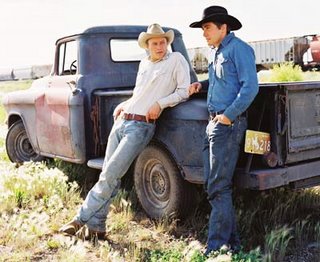---------------------------------------------------

"Brokeback Mountain" expressed better than any film I've ever seen the tragedy of having "deep-seated homosexual attractions" and being unable to act on them with a good conscience. Acting them out has its own moral, spiritual and other problems, of course. But for a man cursed with the gift of faith, acting out is at one and the same time both only a theoretical option (your conscience won't let you) and one that will always look attractive (the grass is always greener). You can accept that Jack and Ennis were victims of a society that gave them no way to understand what they did and how they felt about it (which in some sense is clearly true, both of the movie and of the "real-life world" that it depicts). Because if the Church teaching on grace, and all three paragraphs of the catechism mean anything, it is that a social response of mere disapproval may be worse than nothing.
No man with homosexual attractions forgets the first time he ever had a serious love-crush on a male friend in a disapproving environment -- disapproval being either internal (morality) or external (society). There's a strange mix of terror and lust, and a need for SOME sort of same-sex approval that I cannot imagine having absolutely any equivalent in the straight world. It's a whirlpool of attraction and revulsion. You know that what you most want, what your body is telling you (and male bodies can't be fooled), is wrong and/or that acting according to it would ruin you in the eyes of the other, the one you love (in some sense). And in the eyes of the Other Who loves you. And in some sense yourself. If you know/believe (rightly or wrongly) that homosexual acts are wrong, there is simply no secular way out. Only the acceptance of tragedy, the embracing of the Cross, and seeking to die to self.
I think that's why I've always had a taste for romantic tragedy and can't watch "Brief Encounter" (which is about two adulterous spouses) without crying. And why once you understand that "Brokeback Mountain" is a tragedy, you don't have to take the implications from it that the secular liberal reviewers want you to -- "so why couldn't they just marry. Bad society, bad society. (Whack society on the nose with a newspaper.)" The essence of romantic tragedy is that it...can't...be for whatever reason. And to ask for reasons is to reject the world of tragedy, or presuppose a world in which tragedy is impossible. One where you ask "Why didn't Miss Julie and Jean go their separate ways?" Or "Why couldn't Anna Karenina just get over it?" "Couldn't Madame Bovary have joined her church's women's group or taken a yoga class?" "Othello and Desdemona needed to go to a marriage counselor to work on the trust issues."


1 comment:
That is it, I suspect: the 'world'--the 'progressive', post-post-modernists, materialist utopians, with all the resources of technology--they "presuppose a world in which tragedy is impossible". And if tragedy is impossible, then being human becomes impossible also: How beautious mankind is: O brave new world....
Post a Comment